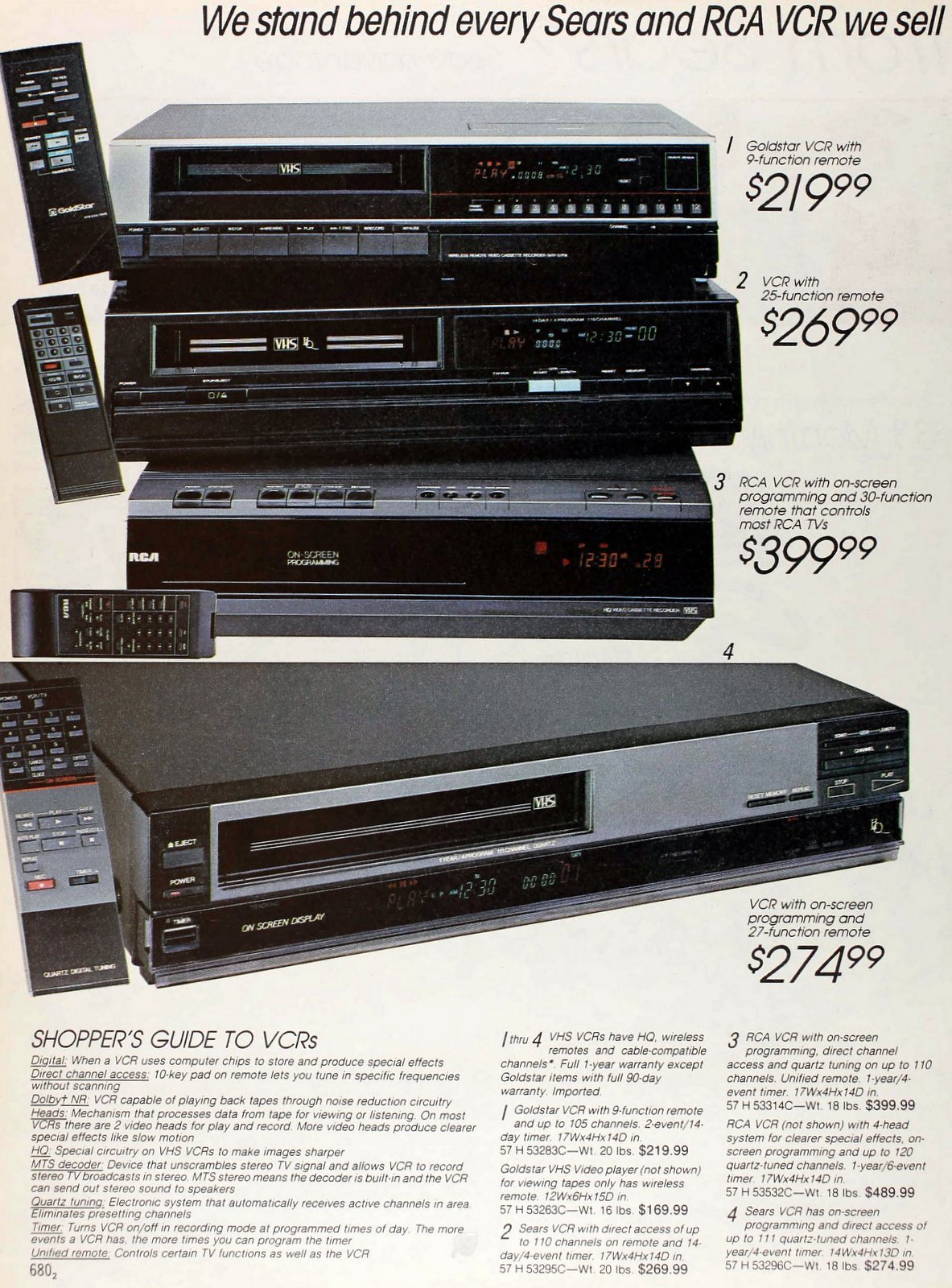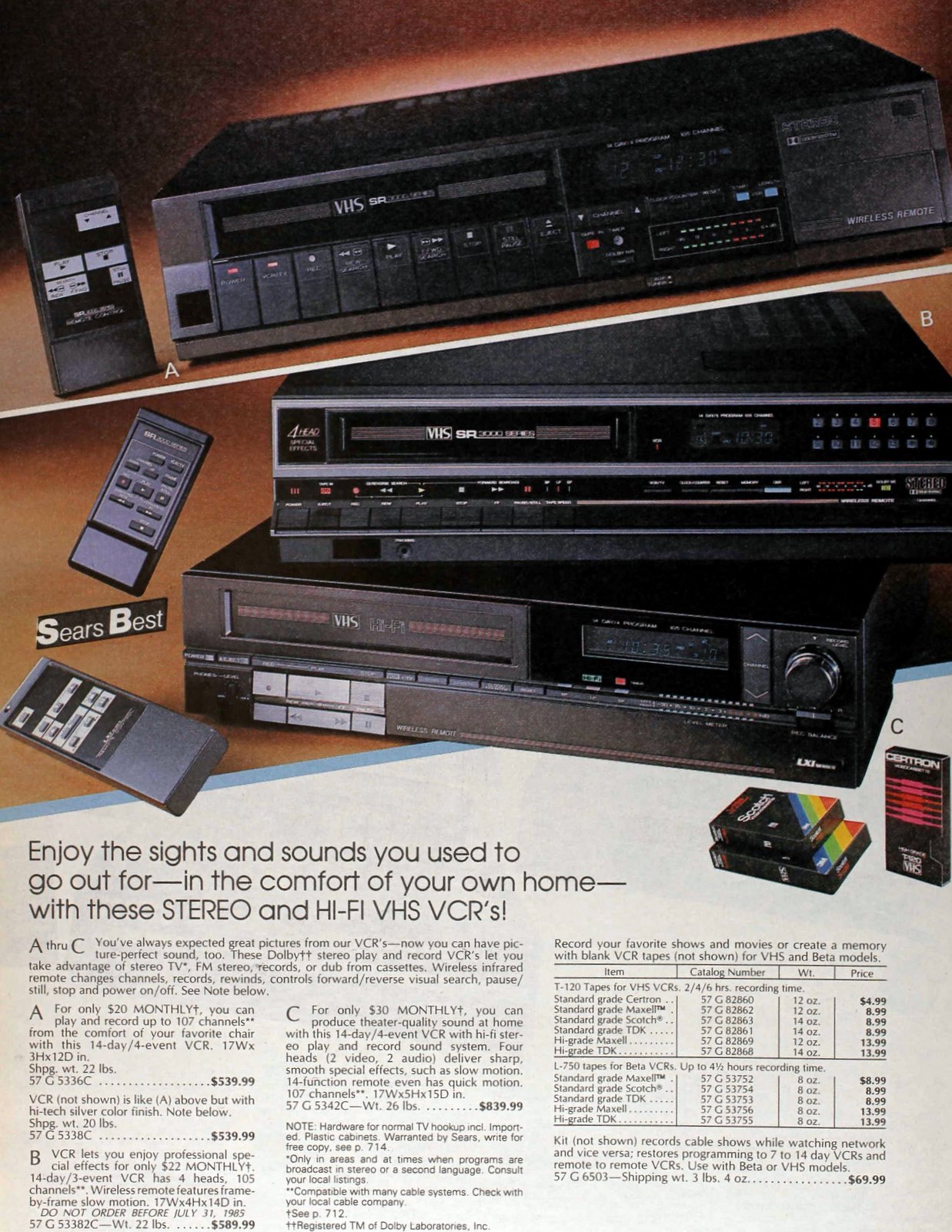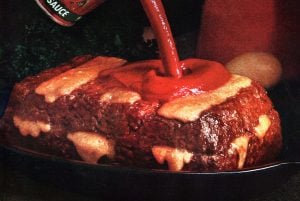
In 1977, RCA made waves by announcing its SelectaVision VCR, the first long-playing model with a four-hour recording capability. It was priced at $1,000, which undercut competitors by about $300. RCA had held back on releasing a VCR until it could offer something it believed consumers actually wanted: better features at a lower price. Roy Pollack, an RCA vice president at the time, was candid about the risk, but also confident in the product. He called it “a new era of television viewing,” betting big that 250,000 units would be sold by the end of the year.
- 4-head VCR offers 1-touch recording
- Convenient front-panel audio-video inputs
- Commercial skip and program index search
The gamble paid off. RCA’s SelectaVision could connect to any TV and came with a built-in timer so users could program recordings even when they weren’t home. Compared to the earlier models that could only hold two hours of content, this new option doubled the convenience. Other brands quickly followed suit, with Magnavox, Zenith, JVC and NEC all pushing out their own takes on home video recorders. By the mid-1980s, improvements like Hi-Fi stereo sound and sharper images made these machines feel increasingly refined.

Once considered a luxury item, the VCR became a household standard by the end of the 1980s. Prices dropped, options expanded and video rental stores grew rapidly to meet the demand. People could now pause live shows, skip commercials, build movie libraries and tape everything from weddings to late-night talk shows. The player/recorder dramatically changed viewing habits — to the point of even creating entirely new ones. If you wanted to watch a whole season of TV, or a few old movies that weren’t playing on TV or cable, videotapes were just the ticket.
- Convert Your Old Video Tapes or Camcorder Tapes to Digital Format With The Touch of a Button (Recording Resolution: SD 640x480 or 720x480 Pixels. Does Not Upscale To HD. Does Not Record From Modern...
- Record and Digitalize Video From VHS, VCR's, DVD Players, DVR's, Camcorders, Hi8, & Retro Gaming Systems (IMPORTANT: A WORKING VCR/CAMCORDER AND WORKING VIDEO TAPES ARE REQUIRED; CONVERTER DOES NOT...
- No Computer or Software Required - Just Hook It Up & Start Recording - Records Videos Directly Onto USB Flash Drive or SD Card (REQUIRED, NOT INCLUDED; 512 GB or less)
Below, we’ve gathered some old VCR ads, images and original write-ups that help show how this technology entered the mainstream. Take a look above and below to see how these vintage machines looked, what they promised and how they were marketed to a generation of viewers!
New VCR by RCA to debut (1977)
Daily Capital News (Jefferson City, Missouri) October 15, 1977
The fledgling home television video tape cassette recorder (VCR) industry, only a year old and with a mediocre track record among consumers so far, receives a big shot in the arm this month when RCA debuts its new four-hour SelectaVision.
As the industry’s first long-playing VCR and cheapest home video machine on the market to date, the new RCA cassette recorder promises to usher in the “new era of television viewing.”
“RCA’s delayed entry into the home video cassette field results in a product more in tune with the desires of the consumer for a superior VCR at an affordable price,” says Roy Pollack, a vice president of RCA.

Pollack readily admits during an interview that the home VCR field is risky, noting that other major manufacturers have tried and failed to sell their machines.
As a result, he says, RCA is putting its reputation on the line with its SelectaVision.
But RCA officials are so convinced that SelectaVision will succeed that they expect to sell 250,000 video sets between October and the end of 1977.
SelectaVision, which will be available in retail outlets this month, will be priced at $1,000, some $300 below its nearest competitor. The unit will provide the choice of recording either two or four hours of program material on a single tape cassette. Current units on the market only offer two-hour capacity.
SelectaVision attaches to any brand of television receiver, and allows the user to record up to four hours of television in color for viewing at a later time. By using the built-in clock timer, programs can be recorded automatically if the viewer is away from home. You also can record the program being viewed or another program on a different channel at the same time.
RCA SelectaVision commercial – 1977
“You’re watching television. We’re watching SelectaVision!”

Vintage Magnavox home video cassette recorder: The better one (1977)

ALSO SEE: The epic evolution of vintage camcorders revolutionized how we captured memories (1970s-1990s)
Introducing the Ultimate VCR, from RCA (1985)
Video cassette recorders have come quite a distance, finally culminating in this marvel — the Ultimate VCR.
Why ultimate? Because it’s the first and only 7-head machine that’s remote-programmible, convertible and features VHS Hi-Fi.

Zenith VHS Hi-Fi Stereo VCR (1985)
When you’re looking for a VCR, go with your ears wide open.
VHS Hi-Fi Stereo is where VCRs are going. And ours are already there. Zenith’s new VHS Hi-Fi Stereo VCRs. With the sound fidelity that rivals a compact disc player. Plus, you can tune in and record those new stereo TV broadcasts, even on your current TV.
Zenith’s new VCRs. It’s the sound and picture experience that practically turns your living room into a movie theater.

JVC HQ System VHS VCR (1985)
JVC just did something about the great image of VHS — they made it extraordinary
How? Introducing HQ (High Quality) System technologies. A new way of processing VHS signals with two noise reduction circuits and a higher white clip level.
The result of the HQ System is immediately clear. The picture is sharper. Colors are more natural. Video noise is virtually eliminated. And, if you record with a new HQ VHS recorder, your recording can be viewed on any existing VHS recorder. JVC ensures that complete compatibility is maintained.
The HR-D566 and HR-D565, JVC’s latest Hi-Fi VHS VCRs, are the first to incorporate the HQ System. Proof that HQ pictures are a visual equivalent to Hi-Fi VHS sound is now available at a JVC dealer near you. HQ System pictures make the VHS advantage clearer than ever before — its quality you’ll recognize on sight.
Shown: HR-D566U HQ Hi-Fi stereo videocassette recorder with MTS decoder

NEC VHS Hi-Fi VCR (1985)
The TV studio: where only the very best equipment is good enough. That’s why TV stations throughout the world turn to broadcast products from NEC — with technology so advanced it’s won two Emmy Awards.
Even if you’re not about to broadcast your tapes coast to coast, it’s comforting to know that NEC builds much of our pro technology into videocassette recorders for the home.
onsider the new N-961U VHS Hi-Fi VCR. NEC’s studio heritage is evident in the glitch-free images during still picture and slow motion. The seamless scene-to-scene transitions of Assembly Editing. The amazing sound of stereo TV reception and the studio-grade stereo recording of VHS Hi-Fi.
The wireless remote control even operates an NEC TV ReceiverMonitor. You see, building first-rate professional products is not enough for NEC. We feel obligated to take the world’s most advanced technology one step further. Into your home.






















